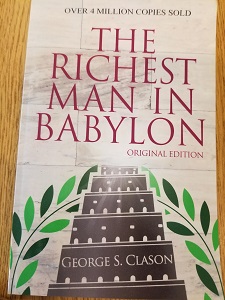
Photo credit: jb
This article is Part Nine, the final portion of our series of the lessons from George S. Clason’s bestseller The Richest Man in Babylon. Did I just hear a collective “FINALLY!”? If you’d like to go back to the beginning and catch up on the earlier lessons, you can start with the first article in the series by clicking this link.
The Luckiest Man in Babylon
In this final chapter, Clason ties all the lessons together with the story of Sharru Nada, a rich merchant, who tells his young companion, Hadan Gula, the grandson of his business partner, the story of how his grandfather had become such a successful merchant.
In a nutshell, the grandfather and Sharru Nada had each found themselves in dismal financial straits. Learning from one another and from listening to the successful people around them, each applied the lessons we’ve discussed throughout this series. With time, effort, patience and discipline, each man gradually improved his situation. Times arose where they were able to help one another out, and eventually they became business partners, successful in every venture they undertook. (Honestly, read the book if you want the whole story – it’s a good, quick read – you’ll not regret the time spent.
The Lessons
Here are the lessons we’ve learned throughout the review of this book:
- Part of all you earn is yours to keep. Another way to put this is: pay yourself first. Begin a savings plan with a portion of all you earn.
- Take advice only from those experienced in the matter of your questions. Don’t ask your barber for advice on surgery, and don’t ask a surgeon for advice on building a house.
- Take advantage of compounding of returns. Don’t spend the earnings that your savings accounts generate; reinvest your dividends.
- Control your expenses – learn to “get by” on only a percentage of what you earn.
- Invest with wisdom. Understand the investments that you make, and make certain that the reward is worthy of the risk in all you invest in.
- Own your own home. This has both a financial and a spiritual benefit.
- Invest with an eye to the long-term. Make certain that your investing activities will provide you with an income in your old age.
- Always improve your ability to earn, either by improving your skillset in your job, or by increasing your knowledge of investment activities.
- Learn to recognize situations when you can take advantage of “good luck”. Take action with good insight, don’t procrastinate.
- Know when to be cautious, especially with regard to loaning money to family and friends.
- Plan in advance for events that might cause you harm – ensure that you’re insured against disaster in all its forms.
- Have a good advisor or advisors to help you understand all of the negative “clamor” around you. This can help you to maintain your discipline in good times and bad.
- Having the right attitude (“the soul of a free man”) can make all the difference in your outlook on life – and therefore on the results you achieve.
- If you find yourself in a debt situation, put a systematic plan in place to eliminate the debt, but not at the expense of your saving plans. Use organization, communication, and discipline to work yourself out of the debt hole and regain your status among your acquaintances and colleagues.
That’s the list that I’ve developed of the primary lessons from this book. I hope that if you weren’t already familiar with the book that this series has sparked an interest for you. I’d love to hear stories from anyone who has benefited from the book – as well as if you found other gems within its pages that you’d like to highlight. Just leave your stories in the comments section below.